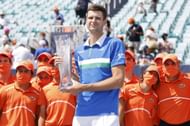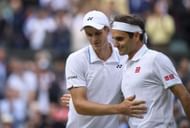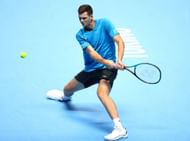A tennis player does battle alone on the court, but it’s hardly an individual sport. Just as it takes a village to raise a child, it also takes a village to raise a professional tennis player.
The tennis coach, it goes without saying, is one of the leading players in this script. There has rarely been a great player who didn't have a great coach by their side throughout their career.
Craig Boynton is currently among the leading coaches on the men’s tennis circuit. Having worked with Jim Courier, John Isner and Mardy Fish in the past, the 57-year-old is now the coach of Hubert Hurkacz.
Boynton has been with Hurkacz since March 2019, and he helped the Pole crack the top 10 for the first time earlier this year. The American's work even earned him a nomination for the ATP Coach of the Year award last month.
Boynton recently spoke with Sportskeeda about a variety of topics, including his own journey from player to coach, what makes Hurkacz special, and on-court coaching. Here are the excerpts of the conversation:
Exclusive interview with Hubert Hurkacz's coach Craig Boynton
Sportskeeda: Can you tell us a bit about how you got involved in coaching, and also about your work with top players like Jim Courier, John Isner and Mardy Fish?
Craig Boynton: Well, I knew that I had a better skill at coaching than I did playing when I was at college in Clemson. Even in those days, I was better at helping my teammates through their issues than sorting through my own issues.
I had worked and trained at Saddlebrook in the late 1980s and the early 90s. I was young, I had good legs to run on, and so the pros that would come in always wanted me to hit with them.
I started to become Jennifer Capriati’s hitting partner. I know Jim Courier from our time on the junior circuit in Florida; I would hit a lot with Pete Sampras and travel with him for a couple of weeks.
I didn't really know much about the coaching aspect. But the players that I was with had high-level coaches, and I just listened and picked their brains. I was fortunate enough to spend a couple of years alongside Courier when he worked with Jose Higueras.
If you look at the coaching tree in other sports, you work under a coach and you take a little bit of what they do and blend it into how you want to deliver it. And then when you work with enough great people and great minds, you develop your own sense of style, if you will.
It was just kind of one opportunity that led to another, and things just kind of mushroomed from there.
SK: You worked with Mardy Fish in 2008 and 2009. Earlier this year, Fish released a documentary where he openly talked about his mental health struggles. Having worked with him in the past and seeing his struggles from an outsider's perspective now, what are your thoughts on his journey?
Craig Boynton: For all these players it's a stressful environment, and what they do is not easy. I did not see the struggle that much when I was working with Mardy, because he hadn’t hit his ascent yet. He did that a couple of years after we worked together.
In sports, the higher you go, the more pressure and the more expectations are put on you, so it's not easy to manage. And seeing what happened with Mardy wasn't a surprise. But I'm really glad that he got the help he needed and was brave enough to come out and say, "Hey, this is an issue".
I think it just opened the doors for so many other athletes to voice similar concerns, or (other) issues that they have. Because it's just not easy. You flip on the TV and you see these men and women play and travel all over the world. But really, take it from me, what they do is not at all easy.
SK: You've been working with Hubert Hurkacz for the past couple of years. 2021 was a really great year for him, as he broke into the top 10 and reached his first Grand Slam semifinal. What were the factors that you think led to that breakthrough?
Craig Boynton: I think a lot of things got a little bit better; it wasn't like one specific thing. His first serve percentage got a bit better, the second serve percentage, placement and speed got a little better, the overhead and the transition coming forward got better.
But I would I would say that the No. 1 thing was kind of between his ears. Hubi (Hubert) has a better understanding of who he is and what makes his car go, if you will, and an understanding of what doesn't make the car go. And so I would say working with a better understanding of clarity would be the biggest improvement that he has had this year.
SK: In addition to making the Wimbledon semis, Hubert Hurkacz also had some great results at the Masters; he won Miami and reached the Paris last four. What do you think he needs to do to keep producing such big runs next year and beyond?

Craig Boynton: When I first started working with Hubi, he already had a good Master Series record. It's the Grand Slam record that needs to catch up with the Masters record. And I think it’s just having a consistent high level of play throughout the year.
This year, he has improved. One of the great things about Hubi is that he improves slowly. And you might wonder, why is that great? A wise man once told me what you gain slowly, you will lose slowly.
Once Hubi gets through these little barriers, he's at a higher level and he doesn't go backwards. And that's really kind of the beauty of it.
My biggest attribute that I need to work upon has to be patience with him, because he does come across things slowly. So I need to learn, and I think I've done a pretty good job of knowing when to push him, how hard to push him and when to pull back.
I think we're just getting better at that as a team. He's understanding me better and I'm understanding him better.
One of the things I'm really proud of is that I'm an American coaching a successful Polish tennis player. We come from very different backgrounds and countries but we have an understanding and we accept each other for good, bad, indifferent. We work towards a common goal, a greater good, which is his improvement on and off the court.
SK: What are the training plans for Hubert Hurkacz during these few weeks of the off-season?
Craig Boynton: Hubert is in Europe right now. Qualifying for the ATP Finals was an amazing accomplishment for him. But at the same time, it has also really gobbled up his offseason. Some players, who are also playing in the Davis Cup, are literally going to have zero time off.
After the Finals, Hubi had some commitments to the press and media and then he went on a 10-day vacation. As in every pre-season, he trains in the town of Zakopane (which is at the base of the Tatras mountains in Poland) for a couple of weeks and gets in amazing physical shape.
After that it’s almost Christmas, and I need to be home for the holidays. Hence, we are going to get down to Australia as quickly as we can and jump on the court there.
He will have had maybe three weeks off from tennis, of which two weeks are in pre-season training. That's part of what I said earlier, about how difficult this sport is.
In other sports, players have a proper offseason. The ATP Cup, which Hubi is also playing, starts on 1 January, and you've got to be in Australia at least five days or a week before to acclimatize due to the time zone. It really doesn't leave the players with much time.
While the WTA have shortened their season, many of the men are not going to get proper rest. They will just have to manage their schedules in the first quarter of next year accordingly.
SK: You were nominated for ATP Coach of the Year. How did that feel?
Craig Boynton: I'm extremely happy and grateful and it's an honor - not just to be nominated, but to be nominated with this group of guys who are also nominated. We have such a good fraternity of coaches on tour, who are good people and are there to help each other in any way. I'm proud to be part of this larger group.
But it’s not all due to just me. If I did not have the support at home from my family, I would not be able to go on the road for 30-odd weeks a year. And certainly, if I didn't have a player like Hubi, who allows me to keep him accountable, then this would never happen.
So there's a lot of people involved in this, and I'm just a small piece of that nomination. But I'm extremely grateful for it.
SK: There has been a lot of talk lately about experimenting with on-court coaching. The WTA tour allows it at the non-Slam events. Would you like to see the same implemented on the ATP tour as well?
Craig Boynton: I would absolutely love it. I don't know why we don't have it. If you look at any other sport, they all have some sort of coaching, some sort of outlet for the player to communicate, and the progressive ones are always kind of trying to tweak or implement something new. I think we should follow suit in our sport as well.
It's not easy to go out on the court and keep everything in perspective. You're managing all these emotions, the stress, the strategy, and sometimes you just need a friendly reminder or you need to go to plan B.
For the life of me I don't know why there hasn't been something, even if it's small, that they would be willing to do. On the tour, I just think it makes sense.
If you look at the ATP NextGen Finals, they tinker with so many rules there. I just think that to be progressive, the ATP should look to do something every year to get caught up.
When I'm watching the NBA or MLB or NHL, on a timeout when the coach goes over and gets the whiteboard out and is drawing up a play, I want to know what they're talking about. I want to know what's going to happen before I see it.
You have some announcers over here who are former players that can draw that up before it happens with different formations. To me, that's really exciting. And to be able to package that in the right way for the fans, I think it would just be a home run.
I really hope to see the ATP implement some sort of on-court coaching.
SK: Another thing that has caught on in a big way lately is the role of data in analytics. Many coaches have been using that as part of their pre-match strategy. How do you use data when it comes to coaching your players?
Craig Boynton: It depends upon the player that I'm working with. There are some players who want a lot of data, whereas for others it becomes paralysis by analysis.
Data does help provide you with clarity, but it could also take away your sense of feel and instinct. I've always done what's best for the athlete; I think about how they will discern the information, how they will digest a certain game plan. I think data is good, but it's only as good as your player allows it to unfold.
Moreover, I've always been able to pick things out just by watching matches or videos. So I try to package that in a way to Hubi where it doesn't get in his way.
Another thing I love is that if I know someone who is really analytically based, I just go over Hubi’s tendencies and tell him, "Look, do the opposite. If you've been serving there the last five or six matches, change it up to keep your opponent guessing."
SK: How do you see the 2022 season unfolding? Which players do you think are going to be the main contenders for the big titles next year?
Craig Boynton: I think you can put the players in a couple groups. You have the front-runners who are going to be the favorites to win any kind of big event, such as Novak Djokovic, Daniil Medvedev and a healthy Rafael Nadal. Roger Federer, I don't know for sure. We will see when Roger comes back and how much he plays.
After that, it's a very close group of probably about eight guys, including Hubi, that are right there, or just getting there.
I’m not going to be surprised if any of these eight to 12 guys win a Slam or the big tournaments next year. For Hubi, he hasn't played Nadal. He was two points away from beating Djokovic in Paris; he didn't but he’s very close.
He hasn’t beaten Alexander Zverev but he’s got a win over just about everybody else there. So he is very dangerous and really tricky to play against.
It’s kind of a fun time right now. I wouldn't say it's a changing of the guard. I would say there are a lot more guards that are going to be around the castle, and I'm excited to be tethered to one of those guys.
SK: One of the biggest highlights of Hubert Hurkacz’s year was beating Roger Federer at Wimbledon. Were you surprised at his ability to play such high-quality tennis throughout the encounter?

Craig Boynton: No, I'm not surprised. I'm more surprised when he's not doing that.
Hubi is really good on grass. When you look at his game, he's not as flashy as some of his peers. But you don’t know how tough he is until you play him and feel the weight of his ball, and feel his serve - which is really dynamic and tough to read. When Hubi’s strengths are firing, he's no fun to play.
There were also a lot of things at Wimbledon that worked out in his favor, and everyone needs some kind of luck when you make a deep run in any of these tournaments. For Hubi, his good fortune happened the round prior, when he was two-sets-to-one down and it started raining.
I had a chance to speak to him in the locker room and then they moved his match with Daniil Medvedev to the next day, on to Centre Court. He got the benefit of scrubbing up his mindset and his tactics. And then him having the chance to play on Center Court in preparation before playing Federer. So he had that experience out of the way.
When he started playing Roger, he got up an early break and was able to settle in and just play. In the second, he was in almost all of Roger's service games. And then once you get to the tiebreaker, anything can happen.
I just felt that the set was an absolute must-win for Roger. I just didn't think Roger was going to come back from two-sets-to-love down.
Hubi winning the third set wasn't a surprise. It was a surprise that it was 6-0, but I felt that the mountain of two-sets-to-love down was just too big for Roger to crawl back out of, especially the way Hubert was serving.
SK: Do you have particular ranking goals or result goals in mind for the players that you work with?

Craig Boynton: I have never really been a coach that is result or goal oriented. Like I said earlier, you need some things to break your way.
For example, at the Paris Masters, when I looked at Hubi’s draw, I thought this is like the who’s-who of players against whom he struggles. But he ended up playing the players who beat those potential stumbling blocks, and they turned out to be a better match-up for Hubi.
For me as a coach, there's so much that's out of your control in terms of having a particular result or ranking. I've always been the kind of coach where I close my eyes, and I have a vision of my player firing on all cylinders, how their game is dynamic and how they're going to put the pressure on their opponent.
Then whatever number is by their name every Monday when the ranking comes out, it is what it is. The most important thing for me is trying to achieve that vision that I have for them, and those are the goals I work on.
SK: What are some of the areas that you would specifically like Hurkacz to improve on in the next year, which you think would move him closer to the vision that you have for him?
Craig Boynton: 2021 was a great year for him because he accomplished a lot of firsts. And it takes more energy if you're doing something for the first time.
I'm really interested to see how much more relaxed he is going into these situations that, quite frankly, were nerve-wracking and churned up a lot of energy for him this year. With him being more comfortable in his own skin, I think we're going to have more dynamic play and see more of his sheepish smile on court next year. That's what I'm looking for.
Who Are Roger Federer's Kids? Know All About Federer's Twins
